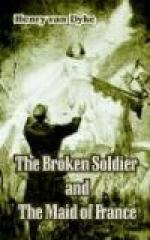He was silent for a few moments, letting his thoughts wander through the pleasant paths of that little garden of repose. His eyes were dreaming, his lips almost smiled.
“It was sweet at ‘L’Alouette,’ very sweet, Father. The farm was in pretty good order and the kitchen-garden was all right, though the flowers had been a little neglected. You see, my wife, Josephine, she is a very clever woman. She had kept up the things that were the most necessary. She had hired one of the old neighbors and a couple of boys to help her with the plowing and planting. The harvest she sold as it stood. Our yoke of cream-colored oxen and the roan horse were in good condition. Little Pierrot, who is five, and little Josette, who is three, were as brown as berries. They hugged me almost to death. But it was Josephine herself who was the best of all. She is only twenty-six, Father, and so beautiful still, with her long chestnut hair and her eyes like brown stones shining under the waters of a brook. I tell you it was good to get her in my arms again and feel her lips on mine. And to wake in the early morning, while the birds were singing, and see her face beside me on the white pillow, sleeping like a child, that was a little bit of Paradise. But I do wrong to tell you of all this, Father.”
“Proceed, my big boy,” nodded the priest. “You are saying nothing wrong. I was a man before I was a priest. It is all natural, what you are saying, and all according to God’s law—no sin in it. Proceed. Did your happiness do you good?”
Pierre shook his head doubtfully. The look of dejection came back to his face. He frowned as if something puzzled and hurt him. “Yes and no! That is the strange thing. It made me thankful—that goes without saying. But it did not make me any stronger in my heart. Perhaps it was too sweet. I thought too much of it. I could not bear to think of anything else. The idea of the war was hateful, horrible, disgusting. The noise and the dirt of it, the mud in the autumn and the bitter cold in the winter,




